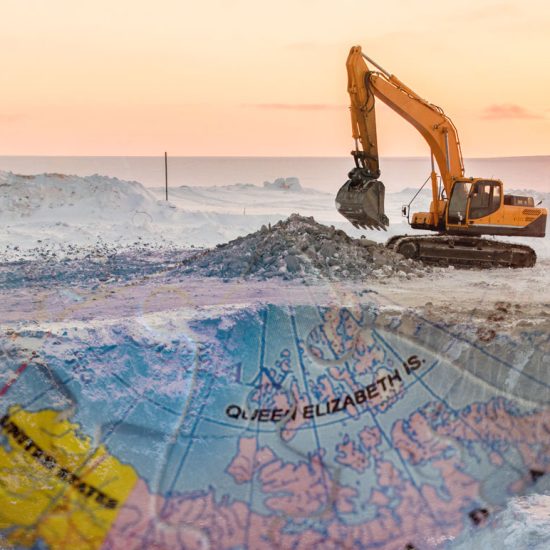
By Ben O'Rourke
December 17, 2021
Why U.S. Senator Dan Sullivan’s Arctic Focus Act is vital to maintain
America’s pole position in the region
In November 2021, more than 20 cargo ships were stuck in ice while trying to navigate Arctic Sea routes, according to The National. These paralyzed vessels included internationally owned bulk carriers and an oil tanker, notes the news publication, which blamed “unseasonably bad weather” with waters “frozen earlier than expected.”
20 ice-immobilized ships appear to be a record for a single month.
Cargo sent from the Bering Strait to the Barents Sea has risen dramatically, with more than 1.5 million tons of goods shipped by mid-October, according to Russian government statistics. That’s about 80% higher than 2020. But sea ice is becoming a big problem. Despite numerous claims the opposite is happening, sea ice is growing, according to Arctic Today’s website, and by late October, much of that Northern Sea Route was covered.
Over 2021, Russia gladly stepped up to the centerstage for accolades, deploying icebreakers to free the vessels and their crews, as getting stuck can lead to potentially disastrous supply shortages. Russia has dozens of icebreaking ships – many of them nuclear-powered – while the United States Coast Guard (USCG) has three and the “Polar Star” is the only operational heavy icebreaker in service, with three more VT Haltering Marine Polar Security Cutter design vessels expected in the mid to late-2020s, but already falling behind schedule.
 It’s no surprise then that news stories about the USCG rescuing seamen trapped in ice are rare.
It’s no surprise then that news stories about the USCG rescuing seamen trapped in ice are rare.
With Russia and China among the countries scrambling for resources in the region, U.S. Senator Dan Sullivan (R-AK) has responded to the communist countries’ presence by introducing the Arctic Focus Act.
The new law aims to ensure investment in the region while benefitting the United States by improving access in the Arctic. Expedited ingress and egress through the labyrinth of ice that limits transportation will also protect U.S. resources, and territory, from wandering adversaries.
“We are making significant investments in vessels, infrastructure, research, and personnel to expand America’s presence in the Arctic, yet the United States continues to trail Russia, and even China,” said Sullivan.
The United States, it seems, appears to have missed the boat when it comes to preparing itself for the current scramble for Arctic resources, choosing instead to pour billions of dollars into building expensive ships. The USS Gerald Ford (CVN-78) aircraft carrier is, at $13 billion, the world’s most expensive ship. Then there’s the almost-too-expensive-to-operate Zumwalt-class stealth destroyer, which is equipped with a rail gun that fires rounds costing $200,000 each. The U.S. has three of these juggernauts in operation.
The Arctic seems to have been off the radar in terms of strategic importance by successive governments. For several years, Senator Sullivan has been trying to resolve the problem and counter foreign aggressors.
“If we are to keep pace with our adversaries and realize our role as an Arctic nation, these historic investments need to be directed by policy and clearly defined objectives that advance America’s economic and national security interests in this important region,” added Sullivan. “I look forward to discussing the goals of the Arctic Focus Act with my colleagues as we work to protect America’s sovereignty in our Arctic and build upon the enormous progress we’ve made these past six years.”
 Previously, Sullivan spearheaded the Strategic Arctic Naval Focus Act in 2019. SANFA followed warnings because of Chinese and Russian movements in the region. Russia has been refurbishing dozens of military ports and airfields, while China unveiled plans for a polar “Silk Road.” Both nations continue to escalate drilling, commercial fishing, and exploration in the region, and in some instances, perilously close to Alaskan waters.
Previously, Sullivan spearheaded the Strategic Arctic Naval Focus Act in 2019. SANFA followed warnings because of Chinese and Russian movements in the region. Russia has been refurbishing dozens of military ports and airfields, while China unveiled plans for a polar “Silk Road.” Both nations continue to escalate drilling, commercial fishing, and exploration in the region, and in some instances, perilously close to Alaskan waters.
Head of the United States Strategic Command, General John Hyten (currently the Vice Chairman of the Joint Chiefs of Staff) said at the time of Sullivan’s first measure, the Arctic “is no longer a buffer zone” and “we need to have a presence there that we have not invested in in the same way that our adversaries.” Meanwhile, General Terrence O’Shaughnessy, Commander, United States Northern Command and North American Aerospace Defense Command, insisted “defense of the homeland depends on our ability to detect and defeat threats operating both in the Arctic and passing through the Arctic,” pointing to Russia’s deployment of long-range cruise missiles.
Senator Sullivan’s Arctic Focus Act puts more power in the hands of the USCG, diverting money to Alaskan waters that would otherwise be spent far away on Antarctic operations as there are “not enough assets” for both regions. The Coast Guard will have to develop a plan for how it wants to move this forward and submit it to Congress as a condition of the Act.
The proposed bill also sets a 2030 deadline for enough icebreakers to keep the Northwest Passage open to trade, defense, rescue operations, and scientists. Sullivan wants “at least one major cutter on patrol in the Arctic” at all times for search-and-rescue operations, helping enforce fishing rules, and responding to pollution incidents. Supporting defense operations is also an aim of the icebreaker.
As the Arctic truly is one of our last frontiers, in concert with Antarctica, the deep sea, and outer space, the region’s connectivity and proximity to the 49th state is of particular concern to Senators Dan Sullivan and Lisa Murkowski, as it should be.
Here’s hoping their congressional colleagues on both sides of the aisle concur.
 Ben O’Rourke recently joined the Alaska Politics & Elections team. Ben has more than 25 years of media experience in radio, television, online, and newspapers working globally in Hong Kong, Singapore, Australia, and the United Kingdom. He accidentally landed into news journalism in 2003 and has been writing, reporting, and producing videos and nightly news programs for Hong Kong television and South China Morning Post ever since. He’s currently a freelance news editor at Fieldsports Britain, a popular hunting, shooting, and fishing channel on YouTube. Ben spent three weeks in Alaska filming a documentary and that time had a profound effect on him and it quickly became his favorite U.S. state.
Ben O’Rourke recently joined the Alaska Politics & Elections team. Ben has more than 25 years of media experience in radio, television, online, and newspapers working globally in Hong Kong, Singapore, Australia, and the United Kingdom. He accidentally landed into news journalism in 2003 and has been writing, reporting, and producing videos and nightly news programs for Hong Kong television and South China Morning Post ever since. He’s currently a freelance news editor at Fieldsports Britain, a popular hunting, shooting, and fishing channel on YouTube. Ben spent three weeks in Alaska filming a documentary and that time had a profound effect on him and it quickly became his favorite U.S. state.











